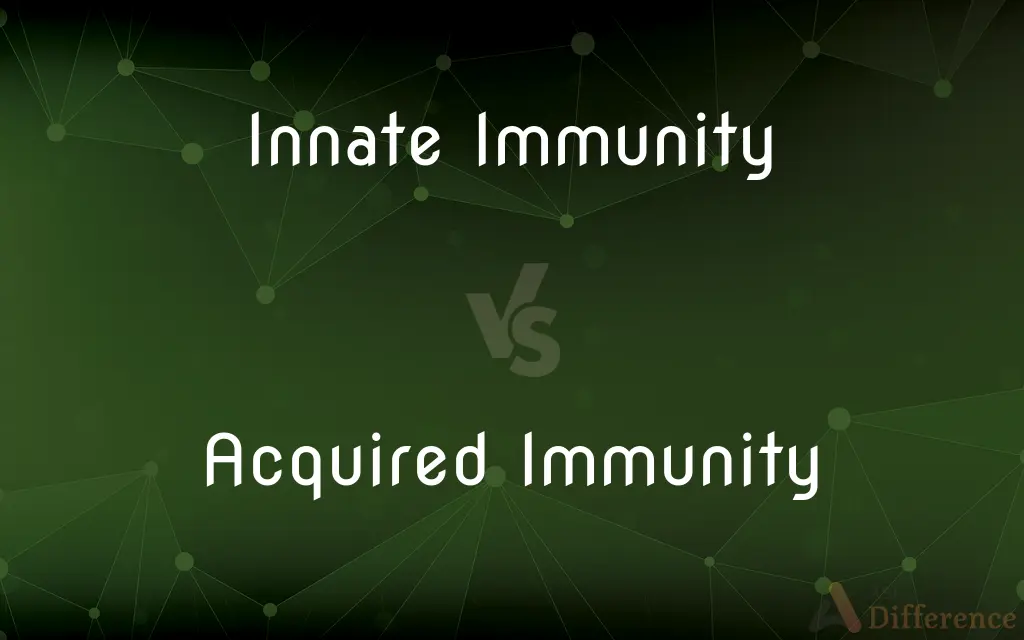Innate Immunity vs. Acquired Immunity — What's the Difference?
Edited by Tayyaba Rehman — By Fiza Rafique — Published on January 2, 2024
Innate immunity is the body's first-line, non-specific defense; acquired immunity is specific and develops after exposure to pathogens.

Difference Between Innate Immunity and Acquired Immunity
Table of Contents
ADVERTISEMENT
Key Differences
Innate immunity is the body's inherent defense system that is immediately operational from birth. It involves barriers like skin, the acidic environment of the stomach, and immune cells such as neutrophils and macrophages. Acquired immunity, on the other hand, is the immunity that one develops throughout life as a result of exposure to pathogens or through vaccination.
Innate immunity responses are not specific to a particular pathogen and do not confer long-lasting immunity to the host. In contrast, acquired immunity responses are highly specific to the encountered pathogen and generally provide long-lasting protection. Acquired immunity involves the activation of lymphocytes and the production of antibodies, which can specifically target and remember pathogens.
The components of innate immunity are genetically encoded and passed from parents to offspring, equipping the individual to fend off infections immediately. Acquired immunity is not present at birth and must be developed either after an infection or through immunization. Each encounter with a pathogen strengthens the acquired immune response through memory.
Innate immunity also includes systemic responses such as inflammation and fever, which help to create an environment less hospitable to pathogens. Acquired immunity, through the actions of B cells and T cells, can eliminate infected cells or create barriers that prevent pathogens from entering the body.
While innate immunity acts quickly, usually within minutes to hours of an infection, it does not improve with repeated exposure to the same pathogen. Acquired immunity may take days to weeks to develop after initial pathogen exposure, but its memory response is rapid and more effective upon subsequent exposures.
ADVERTISEMENT
Comparison Chart
Specificity
Non-specific
Highly specific
Memory
No memory, response is constant
Memory, response improves with exposure
Components
Physical barriers, phagocytes, NK cells
Lymphocytes, antibodies
Response Time
Immediate (minutes to hours)
Delayed (days to weeks)
Adaptability
Fixed, genetic
Adaptable, evolves with exposure
Compare with Definitions
Innate Immunity
Innate immunity is the body’s immediate, general defense against pathogens.
The skin is part of innate immunity, acting as a barrier to infections.
Acquired Immunity
Acquired immunity adapts to new pathogens through exposure.
Acquired immunity evolves to recognize and neutralize mutating viruses.
Innate Immunity
Innate immunity does not target specific pathogens.
Innate immunity responds to a cut with inflammation, regardless of the invading pathogen.
Acquired Immunity
Acquired immunity targets specific pathogens.
After recovery from chickenpox, the acquired immunity prevents reinfection.
Innate Immunity
Innate immunity triggers inflammation to combat infections.
Inflammation is a sign of the innate immune system working to heal an injury.
Acquired Immunity
Acquired immunity involves the production of specific antibodies.
Antibodies generated by acquired immunity can neutralize toxins.
Innate Immunity
Innate immunity includes the activity of phagocytes engulfing foreign substances.
Macrophages, a component of innate immunity, digest pathogens entering the body.
Acquired Immunity
Acquired immunity can confer lifelong protection against certain pathogens.
The body’s acquired immunity remembers the measles virus, preventing future illness.
Innate Immunity
Innate immunity is present from birth and not acquired through exposure.
Newborns rely on innate immunity before their acquired immune system is developed.
Acquired Immunity
Acquired immunity develops memory after an initial exposure to a pathogen.
Vaccinations utilize acquired immunity to prevent diseases.
Common Curiosities
Do vaccines affect innate or acquired immunity?
Vaccines primarily stimulate acquired immunity by mimicking pathogen exposure.
Can innate immunity remember a virus?
No, innate immunity does not have memory; it treats each exposure to pathogens similarly.
Is acquired immunity present at birth?
Acquired immunity is not present at birth; it develops after exposure to pathogens.
How does acquired immunity work?
Acquired immunity works by recognizing specific pathogens and generating a targeted response.
What constitutes innate immunity?
Innate immunity consists of physical barriers, immune cells like macrophages, and natural killer cells.
Is fever a response of innate or acquired immunity?
Fever is a systemic response of innate immunity.
What role do antibodies play in innate immunity?
Antibodies are not part of innate immunity; they're involved in acquired immunity.
Is innate immunity the same in every individual?
Yes, it is largely the same in every individual of the same species.
Does acquired immunity decrease over time?
Acquired immunity can decrease if not reinforced by periodic exposures or vaccinations.
How fast does innate immunity respond to an infection?
Innate immunity responds almost immediately, within minutes to hours.
Can innate immunity be enhanced?
Innate immunity is genetically fixed and cannot be enhanced by exposure.
Are allergies a part of acquired immunity?
Yes, allergies are an inappropriate response by acquired immunity to harmless substances.
Can acquired immunity be transferred from one person to another?
Yes, through transfer of antibodies, as in mother to infant through breast milk.
Are autoimmune diseases a failure of innate or acquired immunity?
Autoimmune diseases are primarily associated with failures in acquired immunity.
What is a primary response in acquired immunity?
The primary response is the initial response of acquired immunity to a specific pathogen.
Share Your Discovery

Previous Comparison
Fats vs. Oils
Next Comparison
Supervised Learning vs. Unsupervised LearningAuthor Spotlight
Written by
Fiza RafiqueFiza Rafique is a skilled content writer at AskDifference.com, where she meticulously refines and enhances written pieces. Drawing from her vast editorial expertise, Fiza ensures clarity, accuracy, and precision in every article. Passionate about language, she continually seeks to elevate the quality of content for readers worldwide.
Edited by
Tayyaba RehmanTayyaba Rehman is a distinguished writer, currently serving as a primary contributor to askdifference.com. As a researcher in semantics and etymology, Tayyaba's passion for the complexity of languages and their distinctions has found a perfect home on the platform. Tayyaba delves into the intricacies of language, distinguishing between commonly confused words and phrases, thereby providing clarity for readers worldwide.
















































